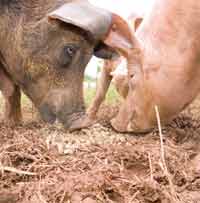Q&A: Swine flu and UK farmers

The outbreak of deadly swine flu H1N1 in Mexico has led governments across the world to tighten surveillance of pig and pigmeat imports.
Meanwhile industry leaders have sought to reassure consumers it is safe to eat pork. But what could the outbreak mean for UK farmers?
What is swine flu?
Swine flu is a respiratory disease, caused by influenza type A, which affects pigs.
The current strain is a variant of the H1N1 influenza virus, which commonly affects humans. But this version contains genetic material typically found in strains that affect pigs and birds.
Is swine flu already in the UK?
Yes, but at a low level and not the current variant of the H1N1 strain, which has caused the deaths of more than 100 people so far in Mexico.
DEFRA says 396 pigs were tested for swine flu in 2008. Of those sampled, 13 were positive.
Voluntary data submitted by UK vets indicate 111 cases of the disease occurred between 2000 and 2007.
Is there anything pig farmers should do?
While no pigs have been found with this variant of the disease, global pig industry bodies have asked farmers to be vigilant about disinfecting and cleaning and visitor access.
Any staff with flu-like symptoms should also avoid working with pigs, as it is possible for them to catch flu viruses from humans.
It is also advised that pig-to-bird contact is prevented to avoid cross-contamination of animals with flu.
What are the symptoms in pigs?
Symptoms of the disease include a sudden onset of fever, depression, coughing and discharge from the nose or eyes.
Pigs could also show signs of breathing difficulties, sneezing, eye redness and loss of appetite.
Any pig health issues should be discussed with vets.
Is it safe for consumers to eat pigmeat?
Yes. The World Health Organisation says there is no risk of catching the disease from eating pork products. But it is vital the meat is cooked properly to ensure the virus is killed.
What could the disease mean for the UK pig industry?
Industry bodies across the world have been at pains to point out the disease is not affecting livestock.
Barney Kay, National Pig Association general manager told the Midlands newspaper Sunday Mercury: “This looks like a human health issue in Mexico and the United States and we don’t know where it has come from, or how it is spread at this stage.
“But we don’t import any meat or breeding animals from Mexico and there’s nothing to suggest anything like this in Europe, let alone Britain.
“At the moment it is not an issue for the UK pig industry.”
